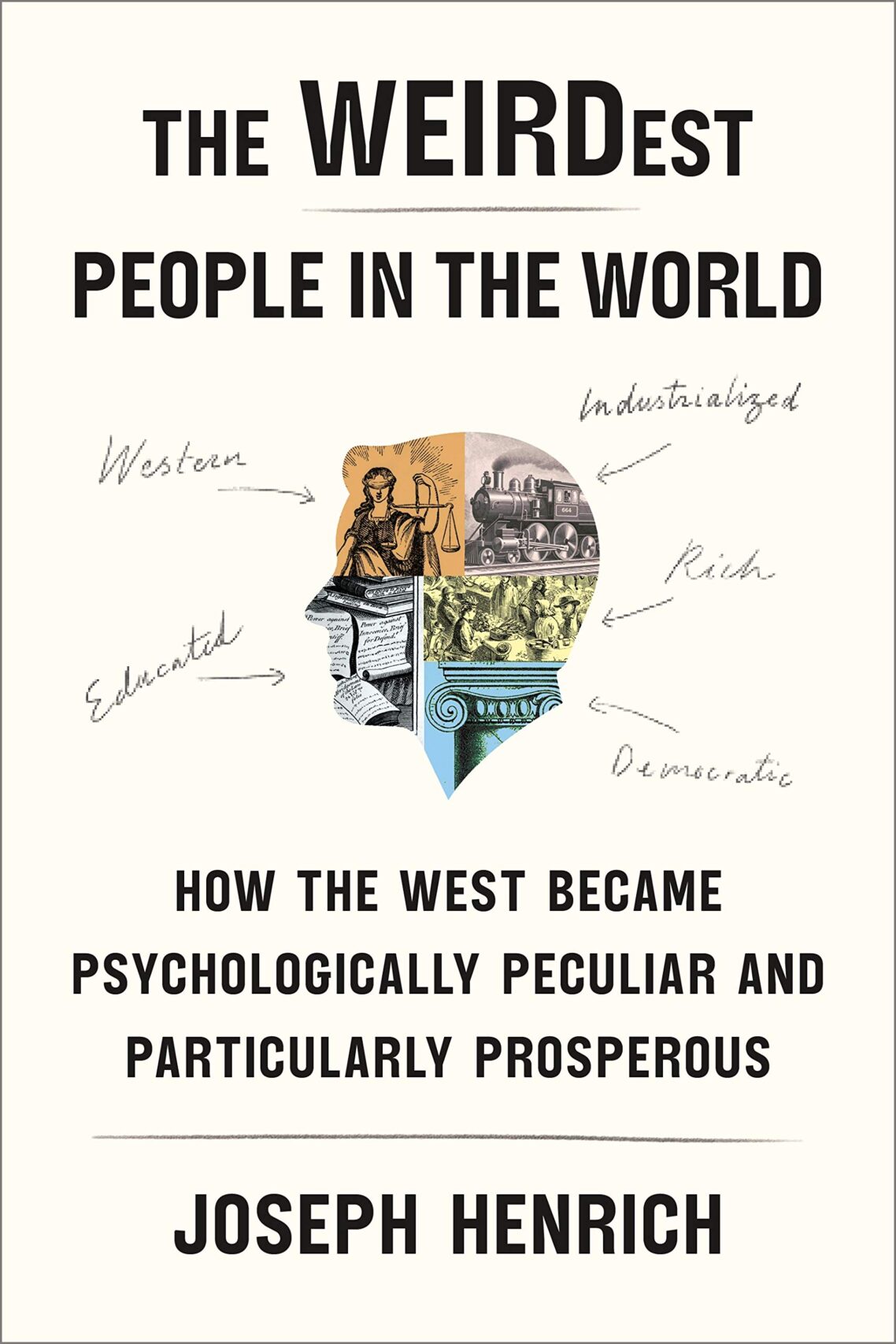I’ll start by sharing a few impressions I developed since coming to the United States in the 1980s. Of the people I interacted with in New York City, I liked the Mediterranean and Hispanic types (such as Italian-Americans, Greeks, and Latin Americans) the most. I felt I could get them. Of the mainstream American population, I felt closest to Blacks and, among Whites, I felt closest to Jews. Among Christians, I preferred Catholics. At the end of the spectrum—and this perception hasn’t changed much since then—were white Protestants. I felt so distant from the latter that they might as well have been extraterrestrials. I could have been tempted to develop racially or ethnically based prejudices based on my impressions. If I had, I would have found out that they had a basis in fact, but my explanation for the differences I felt would have been way off the mark. I would have realized that we—all the people in New York City—were part of the human species, but we were not all the same human beings.
I realized this as a new year of hope was emerging out of the ruins of the pandemic that shook the world in 2020. That’s when I read Joseph Henrich’s book about how people who live in Western, educated, industrialized, rich, and democratic (WEIRD, for short) societies are unlike any who have lived before. The title and subtitle of Henrich’s book sum up pretty well the main theme in the volume’s 680 pages: The WEIRDest People in the World: How the West Became Psychologically Peculiar and Particularly Prosperous. Lest I get carried away in the course of writing this review article, let me add quickly that WEIRD people may have become “particularly prosperous” but they also—at least in my estimation—have grown especially impoverished. I will try to say a word about this in the end.

In the meantime, this is a book for the ages, the opening salvo by the chair of the Department of Human Evolutionary Biology at Harvard University for what I hope will be a new interdisciplinary approach (in this case using anthropology, psychology, economics, evolutionary biology, and good doses of history) not only to the making of our world but also to what really makes us different. No one review article could do justice to the author’s magisterial survey of the longue durée of European history since Late Antiquity. Each of the book’s four parts could be the focus of endless discussions and debate, so I have no choice but to focus on the larger argument and perhaps suggest ways in which this book could change the conversation in our increasingly divided society and world.
When I said that my early impressions of people in New York City had some basis in fact, what I meant is that the people I was dealing with were all wired differently, not because of the color of their skin or their ethnic origins (although both may be indices of real cultural differences), but because of the degree they were shaped and reshaped by the remaking of the human experience inaugurated by the Roman Catholic Church.
Working patiently and assiduously over many centuries, the Church fathers launched a relentless, scorched-earth war on sexual norms by criminalizing polygyny and branding a wide range of potential partners, ranging from cousins and other non-blood relatives (in-laws, for example) with the label of incest until they managed to restrict sexual life to heterosexual pairings. To call such a command an act of social engineering would be an understatement: “No group-living primates,” Henrich quickly reminds us, “have the noncultural equivalent of monogamous marriage.” (Interestingly, from an evolutionary point of view, this new regime seems to favor men over women, since the latter have a wider choice of mates in polygynous arrangements, while poor men without power could be left with no mates.) The Church’s campaign dealt a devastating blow to what the author calls “kin-based institutions,” releasing people from the layered social and cultural obligations that existed previously and still prevailed outside of the Roman Catholic faith into a world of “impersonal prosociality” characterized by individualism, voluntary associations (guilds, monasteries, universities, knowledge societies, political parties, sports teams, etc.), time management (following the introduction of—and mania for—clocks), analytic thinking, competition, the trust of strangers, and social fairness, among other characteristics.
Liberated from the confines of kin-based, tribal mindsets into a cosmopolis of the divine, these Catholics stood shivering in fear and solitude in front of their altars, paying for indulgences, dispensations for cousin marriages, and bequeathing their wealth to the Church to help the living and ensure the peace of the dead. Not only did the doctrine of monogamy reorganize the social order, but, in the process, it also made the Church immensely rich. “By 900 CE, the Church owned about a third of the cultivated land in western Europe, including in Germany (35 percent) and France (44 percent). By the Protestant Reformation in the 16th century, the Church owned half of Germany, and between one-quarter and one-third of England.”

The Reformation, however, ended up being a double-edged sword. It acted like a “booster shot for many of the WEIRD psychological patterns” that had developed under the Church, but it was also, ironically, a rebuke to the Catholics’ patriarchal (the “pope” is literally “papa”) top-down institution. The rebel Christians who had been created by the Church were now ready to read the scripture and develop their own relationship with God, without the mediation of the clergy. New printing presses made copies of the Bible available in several European languages, public schools were established, and the whole social process initiated by the Roman Catholic Church was turbo-charged. Devout, diligent, hard-working, patient, and further rewired by their commitment to literacy, Protestants developed and implemented new notions of individual rights, representative government, and economic systems that would open the gates to hitherto unimaginable riches.
We are accustomed to thinking that the modern world is largely the creation of eighteenth-century Scottish, French and German philosophers whose ideas appeared ex nihilo. Basking in the light of reason, they upended human traditions and launched a new world order that eventually gave us freedom, modernity, and globalization. Not so fast, replies Henrich. “The bottom line is that the Enlightenment thinkers didn’t suddenly crack the combination on Pandora’s box and take out the snuff box of reason and the rum bottle of rationality from which the modern world was then conceived. Instead,” Henrich says, “they were part of a long, cumulative cultural evolutionary process that had been shaping how European populations perceived, thought, reasoned, and related to each other stretching back into Late Antiquity.” The “flotsam of WEIRD ideas,” he explains, “had been accumulating for centuries, pushed along by the swelling river of psychological dark matter—individualism, dispositionalism, analytic thinking and impersonal prosociality.”
In other words, what appeared as a weird religion in ancient Roman times has managed to export its hidden, inadvertent gospel to all human beings, who are now condemned to abandon their rich and sustaining ancestral traditions based on genuine human relations and seek salvation in WEIRD ways, or, at least, pretend to do so. Kin-based societies may have a hard time with democracy and the Western rule of law, but they can’t afford to reject them openly. Mimicry is the fate of all non-WEIRD nations.
Over time, Christians were gradually turned into different human beings, reshaped physically and psychologically by the social habits that flowed from the teachings of the Church. The longer they were exposed to what Henrich calls the Church’s Marriage and Family Program (MFP), the deeper their transformation. Those exposed to Protestantism ended up being the vanguard of these new species. By 1900, it was clear that, because of literacy and analytic thinking, such Europeans had developed a “thicker corpus callosa” and “poorer facial recognition.” They were also poorer holistic thinkers when compared to people who were still embedded in kin-based communities. Another poignant example of how beliefs affect biology is the impact Christian-style marriages and the criminalization of extramarital affairs had on the precipitous drops in testosterone levels in men. “It seems,” Henrich comments not so sardonically, “that a WEIRD endocrinology accompanies our WEIRD psychology.”
In the Muslim world, Africa, and, until the mid-twentieth century or so, China and other Asian countries where polygyny, cousin marriage, and all other sorts of family combinations still prevailed, people remained closer to the pre-Catholic species. With their strong and extended family ties and thick webs of social relations, people with the least exposure to the Church’s Marriage and Family Program are the most likely to be different from WEIRD people, whether in their form of government, morals, dealing with strangers (they are the least likely to donate blood, for example), being comfortable with nepotism (a term, I may add, that was, ironically, coined to describe the corruption of the Church and papacy), and, as is still the case in southern Italy and Sicily (provinces with the least exposure to MFP), using cash and borrowing money from family and friends. Having been spared the dissolution of their kin-based society, non-WEIRD people never developed the skill of coming together in voluntary associations to run their affairs. Their way of being in the world is simply substantially different.
With almost a sense of frustration and impatience at the failure of mainstream psychology to take psychological and neurological variations among the world’s population into account, Henrich reminds us again and again that “culture can and does alter our brains, hormones, and anatomy, along with our perceptions, motivations, personalities, emotions, and many other aspects of our minds.” That culture and psychology are intimately intertwined should by now be quite obvious, and yet American psychology textbooks, based on research and experiments conducted mostly on WEIRD undergraduate students, still overwhelmingly assume that there is an undifferentiated universal self.
Ignoring such culturally-derived psychological variations can lead to misguided and unproductive policies. Take, for example, our educational system. It was created by the same people who gave us most of the institutions that dominate our world. I can understand how a non-WEIRD child shaped by a tradition that prizes holistic thinking could be ill at ease in a rigid environment where analytic thinking is the norm. I had no idea that people of European descent now have some 120 genes “that are associated with schooling outcomes.” Such genes “can potentially influence educational attainment in many ways, including by influencing people’s willingness to sit still, pay attention, use birth control, avoid drugs, and do homework, as well as by contributing to their raw cognitive abilities.”
Cultures do influence our genome to make us better able to operate in the world we have built. The institutions from which we see the world may be inscrutable to us, but we should assume that we are products of particular histories and that WEIRD ways, when assessed against the broad scope of human civilization, are peculiar indeed. No one would have expected northern Europeans to reach such a pinnacle of intellectual and scientific accomplishments in the 11th century, especially since China and the Islamic world were far more advanced. In 1068, the Andalusian scholar Said ibn Ahmad made a scathing assessment of the English and Dutch, describing them as pale barbarians “who have not cultivated the sciences” and “are more like beasts than like men.” He found them lacking in “keenness of understanding and clarity of intelligence and are overcome by ignorance and apathy, lack of discernment, and stupidity.” That such “barbarians” could achieve so much and rise to such cultural heights because of the powers unleashed by monogamy amounts to a miracle comparable to any that has been recorded in the holy scriptures. But it is also proof of our malleability. What seems natural today may not be so tomorrow.
Now is the time to go back to my opening remarks about my impressions and my degree of connectedness with people from different nationalities, skin colors, and religious backgrounds. Having read Henrich’s book, I now realize that I may have more in common with people who have been the least exposed to Western European Christianity, or the Church’s Marriage and Family Program, than I am to Protestants, the elite troops of the WEIRD contingent. The Italian-Americans I met were mostly of southern or Sicilian descent, so that made sense. Black Americans were forced to leave their indigenous religions, including sometimes Islam, to slave on the lands of Christians, mostly Protestants. Throughout European history, Jews had never bought into Christian doctrines and often felt closer to Muslims. While Americans are clashing over visible markers of identity, few realize that these differences are driven by far deeper cultural forces that are hard to detect. Having been wired to engage in impersonal relations, whether it be with fellow humans or markets, WEIRD people have been the catalysts in creating a world of material abundance and cold love. As Max Weber noted long ago, Protestant heroes end up being lonely. This is why I suggested that prosperity is impoverishing us.
I consider Henrich’s book an invitation to reframe the narrative about our differences. If we do, we may very well end up with a deeper sense of our humanity and may even restore our ability to endow our relationships with the intensity that they deserve.





Comments are moderated by the editor and may not appear on this discussion until they have been reviewed and deemed appropriate for posting. All information collected is handled in a manner consistent with our privacy policy.